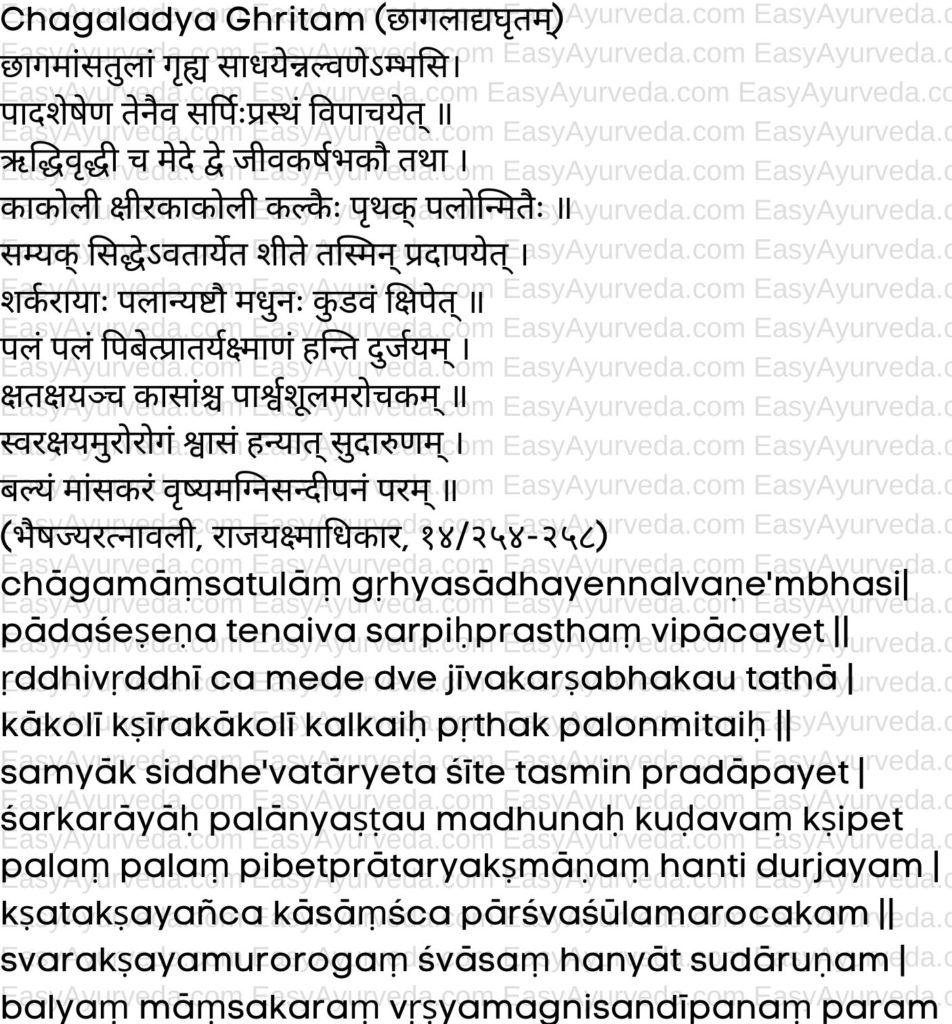Brihat Chagaladya Ghrita is an Ayurvedic medicine in ghee form. It is used in the treatment of all types of Vata disorders involving emaciation, lack of strength, pain, stiffness etc. It contains non veg ingredient.
Table of Contents
ToggleBenefits
Brihat Chagaladya Ghrita uses:
- It is useful in all Vata disorders, epilepsy, psychosis, paralysis, bloating, earache, headache, loss of hearing, sciatica, excessive belching, colic pain of abdomen, spinal problems, difficulty in urination, bleeding disorders, hemorrhoids, intermittent fever, gout, chronic fever, poisoning, skin diseases, inflammation, stiffness, excessive alcoholism, lumbar and cervical spondylosis, all types of arthritis, tremors, oligospermia, menorhagia, emaciation, weight loss.
- It is an anti aging medicine, improves digestion power, strength and immunity.
- It also acts as natural aphrodisiac.
- Post viral fever, when the patient complains of body, muscle and joint pains
Bursitis, - Bursitis trochanterica,
- Shoulder dislocation pain
Effect on Tridosha – Balances Vata and Pitta
It is useful to promote strength of
bones and joints.
It acts as an excellent anti inflammatory and
analgesic medicine.
It is used for the treatment of ankle pain, ankle twitch, slipped disc, sprain, back spasm, backache, back injury, stiffness of muscles, Coccyx pain
Partially useful in (other medications might be required)
Avascular necrosis
Sensory-neural hearing loss
Hypothyroidism
Ankylosing spondylitis
Pain related to SLE
Diet
Avoid deep fried foods, heavy-to-digest non veg foods, fast foods and aerated drinks, smoking and excess alcohol. These can irritate stomach and intestinal lining. These also may increase Tridosha.
Dose and Duration
Bruhat Chagaladi Ghrita Dosage:
3 – 5 ml, once or twice a day before or after food or as directed by Ayurvedic doctor. It is also used in higher doses in Panchakarma treatment.
With western medicines
Seek your doctor’s advice if you are taking this product along with other western (allopathic/modern) medicines. Some Ayurvedic herbs can interact with modern medicine.
If both Ayurvedic and allopathic medicines are advised together, then it is best to take allopathic medicine first, wait for 30 minutes and then, after a gap of 15 – 30 minutes, take Ayurvedic medicine or as directed by the physician.
Can this be used while taking Homeopathic medicine?
Yes. This product does not react with homeopathic medicine.
With supplements like multivitamin tablets, Omega 3 fatty acids etc?
Yes. Generally, this product goes well with most of the dietary supplements. However, if you are taking more than one product per day, please consult your doctor for an opinion.
Pathya– Diet
Meals must be taken in goat’s milk and mutton soup as far as possible. salt and chillies must be reduced and strain avoided. Also to be avoided are exposure to sun and heat and mist, day time sleep, wakeful nights and sex. Bathe in warm water and live in a clean well-ventilated room. Even for small doses observe the rules of light pathya.
How long to take?
This medicine can be safely taken for a period of upto 2-4 months.
Side Effects
Brihat Chagaladi Ghrit Side Effects:
Self medication with this medicine is strictly not recommended. Take this only under strict medical supervision.
Take this medicine in precise dose and for limited period of time, as advised by doctor.
Diabetic, hypertensive patients, cardiac patients, obese people, pregnant ladies, lactating mothers and children should take this medicine strictly under medical supervision.
Over-dosage may cause indigestion and diarrhoea.
Keep out of reach and sight of children. Store in a dry cool place.
Principle
In this herbal ghee, the herbs are infused in the medium of ghee along with herb water decotion. Then the solid waste herb materials are filtered out. Thus, this herbal ghee contains oil soluble and water soluble phyto-active principles of medicinal herbs.
Contents
Brihat Chagayaldya Ghritha ingredients and how to make?
Chagamamsa – Goat meat – 4.8 kg
480 g of each of
Bilva – Bael (root) – Aegle marmelos
Shyonaka – Oroxylum indicum
Gambhari – Coomb Teak (root) – Gmelina arborea
Patala – Trumpet (root) – Stereospermum suaveolens
Agnimantha – Premna corymbosa (Burm.f) Merr
Shalaparni – Desmodium gangeticum
Prishnaparni
Brihati – Indian Nightshade (root) – Solanum indicum
Kantakari – Yellow berried nightshade (whole plant) – Solanum xanthcarpum
Gokshura – Small caltrops (whole plant) – Tribulus terrestris Linn.
Ashwagandha – Winter cherry/ Indian Ginseng (root) – Withania somnifera (L.) Dunal.
Vatyalaka – Country mallow (root) – Sida cordifolia
Ghrita – 4.8 kg
Water for decoction – 24.578 liters, boiled and reduced to 6.144 liters
Ksheera – Cow milk – 3.072 liters
Swarasa of Shatavari – Juice extract of Asparagus racemosus root – 3.072 liters
24 g fine powder of each of
Jivanti – Leptadenia reticulata
Madhuka – Licorice – Glycyrrhiza glabra
Draksha – Raisin – Vitis vinifera
Kakoli – Fritillaria roylei
Ksheera Kakoli – Roscoea purpurea
Utpala – Nymphaea stellata
Musta – Nut grass (root) – Cyperus rotundus
Chandana – Sandalwood – Santalum album
Rasna – Pluchea lanceolata / Vanda roxburghi
Mudgaparni – Green gram – Phaseolus trilobus
Mashaparni – Teramnus labialis / Vigna radiata
Sariva – Indian Sarsaparila – Hemidesmus indicus
Meda – Litsea monopetala
Musta – Nut grass (root) – Cyperus rotundus
Mahameda – Polygonatum verticillatum (Linn.)
Jivaka – Malaxis acuminata
Rishabhaka – Manilkara hexandra (Roxb.) Dubard / Mimusoops hexandra Roxb.
Shati – Curcuma zeodaria / Hedychium spicatum
Darvi – Tree Turmeric (stem) – Berberis aristata
Priyangu – Callicarpa macrophylla
Haritaki – Chebulic Myrobalan fruit rind – Terminalia chebula
Vibhitaki – Belliric Myrobalan fruit rind – Terminalia bellirica
Amalaki – Indian gooseberry fruit – Emblica officinalis Gaertn.
Nata – Indian valerian (root) – Valeriana wallichi
Talisa Patra – leaves of Abies webbiana
Patra – Cinnamomum tamala
Ela – Cardamom – Elettaria cardamomum
Padmaka – Wild Himalayan Cherry – Prunus cerasoides
Vari – Asparagus racemosus root
Nagakeshara – Mesua ferrea
Jatipushpa – Jasminum sambac
Dhanyaka – Coriander – Coriandrum sativum
Manjishta – Indian Madder (root) – Rubia cordifolia
Daru – Himalayan cedar (bark) – Cedrus deodara
Dadima – Pomegranate – Punica granatum
Renuka – Vitex agnus-castus
Elavaluka – Prunus cerasus
Vidanga – False black pepper – Embelia ribes
Jiraka – Cumin – Cuminum cyminum
Sharkara – sugar – 768 g
Reference, Manufacturer and Shelf Life
Reference: Bhaishajya Ratnavali, Vatavyadhi Adhikara, shloka no. 232 – 256
Shelf life: Two years from the date of manufacturing. If you have opened the seal of the container, better to finish the medicine within 2 – 3 months.
Manufacturer: Nagarjuna – Bruhath Cchaagalaadi Ghrutham
Shloka (Sanskrit Verse)
Please consult your doctor before taking this medicine.
This article is written by Dr. Janardhana V Hebbar BAMS, MD (Ayu), PGDPSM, Managing Director, Easy Ayurveda Hospital.
It is reviewed by Dr. Raviganesh Mogra BAMS, MD (Ayu), Chief Medical Officer, Easy Ayurveda Hospital










10 thoughts on “Brihat Chagaladya Ghrita Benefits, Dosage, Ingredients, Side Effects”
which company making this product
Unknown
does keraleeya ayurveda samajam medicines are better than kottakkal? coz i heard keraleeya medicines are non-mechanised, they are making in traditional way
who are the manufacturers of brihat chagayaldya grit
Sir, It is manufactured by Kotakkal Arya vaidya Sala
I am muscular dystrophy patient my doctor advised to take daily before bed time..this medicine will give benefit for me?
Its useful fot diluted cardiomyopathy (heart muscle enlargement) ?
I am doubtful about its efficacy in the said condition.
Can this ghrita be used for snehapana in vatavyadhis?
Yes, definitely